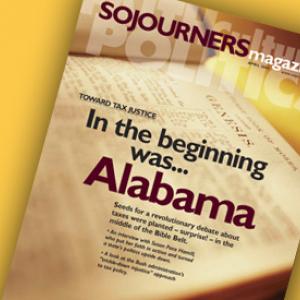Posts By This Author
Reckoning with Faith
More than seven years ago, James Carroll, award-winning novelist and Boston Globe columnist, wrote Constantine’s Sword, which traced the history of anti-Semitism in the chu
Stopping a War
Ruined For Life
A Place in the Country
A broad grassroots movement seeks land, equity, and dignity in Brazil.
Fighting Words
Justice-focused economists understand that the dominant world financial system is based on con- stant replenishment, and those who are unable for whatever reason to contribute
Blindness and Doublespeak
It's likely that the Nazi genocide of European Jews (along with Gypsies, homosexuals, and others considered ethnically or socially deficient) is the most well-documented...
And on This Side of the Pond
The Jubilee 2000/USA campaign
In spring 1995, before the debt crisis was a front-page story, a small group of people representing mainline Protestant churches, peace churches, and Catholic orders and organizations met in Washington, D.C., to brainstorm about creative and effective ways that the U.S. church community could challenge the policies of the international financial institutions. The upstart, ad-hoc group named itself the Religious Working Group on the World Bank & IMF (RWG).
The mandate of the RWG—most of whose members had close contact with people living and working in the "Two Thirds" World—extended across a spectrum of economic justice issues, particularly structural adjustment programs and the debt. However, members soon realized that the crushing debt of the world’s most impoverished countries was a priority and deserved extra attention. They also realized that to continue their work on debt, a strategy needed to be created that would include a broader base than Christian churches. Many members of the RWG were in contact with the coordinators of the Jubilee 2000/UK campaign, and when the British appealed to the folks in the United States to pick up the Jubilee banner, the RWG complied.
At the June 1997 G7 meeting in Denver, when the world’s seven richest countries gathered to discuss the world economic system, RWG members and others concerned about debt cancellation announced the formation of the Jubilee 2000/USA campaign. By December 1997, a campaign platform had been written, additional organizations recruited to join, and the first staff person hired.
Wealth-Fare Reform
A New Look at Cowboys. Or Is It?
Clint Eastwood's latest film, Unforgiven has beautiful shots of Canada, a few violent scenes, some wonderful acting, a title with a dual meaning, and an identity problem.
Volunteers for Change
"Natural Allies: Women's Associations in American History" by Anne Firor Scott
In her newest book, Natural Allies: Women's Associations in American History (University of Illinois Press, 1992), Duke University professor Anne Firor Scott carefully investigates and discusses one of our society's most overlooked and underrated assets, the female voluntary group.
Most of the groups Scott mentions (including benevolent societies established in coastal towns in the 1790s, mid-1800s temperance unions, and community improvement groups of the early 20th century) had some common features: Often the wives and daughters of the communities' most powerful middle- and upper-middle-class men banded together out of a sense of "Christian duty" (though a few non-religiously oriented groups existed) to change their society as they saw fit.
By the mid-1800s the emphasis on benevolence toward individuals had shifted to a more community-focused vision. Many women volunteers, having begun to educate themselves through their organizations, started to work for an end to slavery and for women's suffrage. (The debate over which issue was of greater importance was sometimes heated and ugly.) Later women added concern for labor laws and policies regarding housing and education to their agenda.
The groups did have some problems. They tended to be classist, and integration with groups of activist black women was largely unsuccessful. Also, most of the religious-oriented groups were Protestant; Jewish and Catholic women had their own small organizations, with interaction infrequent.


